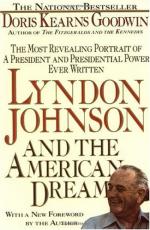
|
| Name: _________________________ | Period: ___________________ |
This test consists of 15 multiple choice questions and 5 short answer questions.
Multiple Choice Questions
1. Who did Johnson appoint to the Supreme Court that he thought mothers would name their newborn sons after?
(a) William Brennan.
(b) Earl Warren.
(c) Thurgood Marshall.
(d) Warren Burger.
2. In "The Withdrawal," why did Johnson withdraw to the White House?
(a) To create a plan to win the war.
(b) Criticism over his policies and faltering Great Society programs.
(c) Fear of Robert Kennedy.
(d) To plot his re-election campaign.
3. What did Johnson call Robert Kennedy in "The Withdrawal"?
(a) His worst nightmare.
(b) A good choice for President.
(c) His closest adviser.
(d) Confused.
4. What 1960s movie did the author watch with Johnson at his ranch in Texas that Johnson disliked?
(a) Cool Hand Luke.
(b) Bonnie and Clyde.
(c) The Graduate.
(d) Guess Who's Coming to Dinner.
5. When did Johnson like to hold press conferences during his first elected term as President?
(a) Thursdays before the 6 pm news.
(b) During weekdays.
(c) Noontime on Tuesdays.
(d) On weekends.
6. In "The Great Society," where does the author say Johnson first introduced the term "Great Society" in a speech?
(a) Georgia.
(b) Texas.
(c) University of Michigan.
(d) Washington, D.C.
7. What country was Ho Chi Minh the leader of in 1965?
(a) North Vietnam.
(b) West Vietnam.
(c) East Vietnam.
(d) South Vietnam.
8. What was one popular singer in the late 1960s that the young people of the peace movement listened to, according to the author in "Under Siege in the White House"?
(a) Bee Gees.
(b) Bob Dylan.
(c) Otis Redding.
(d) Herb Alpert.
9. What legislation passed on August 20, 1964?
(a) Massive tax cut.
(b) Education reform.
(c) Economic Opportunity Act.
(d) The Poverty Reduction Act.
10. What did Johnson think reporters were doing in order to win Pulitzer Prizes?
(a) Discussing the progress of his Great Society programs.
(b) Writing great interviews.
(c) Writing excellent biographies about him.
(d) Sabotaging him.
11. Who was Eugene McCarthy?
(a) White House Aid.
(b) Author.
(c) Democratic Senator who opposed Johnson in the primaries.
(d) Singer.
12. Where did Martin Luther King, Jr. organize a march in 1965?
(a) Columbia, South Carolina.
(b) Austin, Texas.
(c) Selma to Montgomery, Alabama.
(d) Washington, D.C.
13. Who did Johnson choose to be his Vice President in the 1964 Presidential election?
(a) Robert Kennedy.
(b) Hubert Humphrey.
(c) John Stevenson.
(d) William Fulbright.
14. What Vietnamese people did Johnson want to help in the Vietnam War?
(a) South Vietnamese.
(b) North Vietnamese.
(c) Viet Cong.
(d) Communists of Hanoi.
15. What did the North Vietnamese do during the Tet offensive?
(a) Submitted to the South Vietnamese.
(b) Attacked cities in the South thought to be safe from war.
(c) Guarded their positions in the north.
(d) Agreed to a cease fire.
Short Answer Questions
1. According to the author in "The Great Society," what did Johnson equate predictability with?
2. What was the purpose of the task forces that Johnson created on "Great Society " goals?
3. Who said "The people know when you're sick and care when you die" about the Hill Country of Texas?
4. What two other countries did Johnson fear might get involved in the war?
5. Where was Johnson on election day in 1964 when the results came in?
|
This section contains 521 words (approx. 2 pages at 300 words per page) |

|




